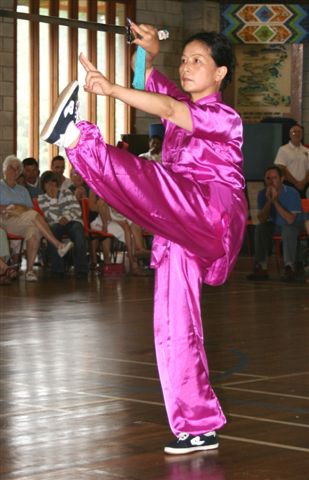
Tai chi is an internal Chinese martial art practiced for self-defense and health. Known for its slow, intentional movements, tai chi has practitioners worldwide and is particularly popular as a form of gentle exercise and moving meditation, with benefits to mental and physical health.

The jian is a double-edged straight sword used during the last 2,500 years in China. The first Chinese sources that mention the jian date to the 7th century BCE, during the Spring and Autumn period; one of the earliest specimens being the Sword of Goujian. Historical one-handed versions have blades varying from 45 to 80 centimeters in length. The weight of an average sword of 70-centimetre (28-inch) blade-length would be in a range of approximately 700 to 900 grams. There are also larger two-handed versions used for training by many styles of Chinese martial arts.
The 24-posture Simplified Form of tai chi, sometimes called the Beijing or Peking form for its place of origin, is a short version of tai chi composed of twenty-four unique movements.
Taijijian is a straight two-edged sword used in the training of the Chinese martial art tai chi. The straight sword, sometimes with a tassel and sometimes not, is used for upper body conditioning and martial training in traditional tai chi schools. The different family schools have various warmups, forms and fencing drills for training with the jian.

Shi Mei Lin is a teacher of Wu-style tai chi. She is the adopted daughter of Wu Yinghua and Ma Yueliang
Wushu was contested by both men and women at the 2006 Asian Games in Doha, Qatar from December 11 to December 14, 2006. It was competed in the disciplines of tai chi, Taijijian, Changquan, Daoshu, Jianshu, Gunshu, Qiangshu, Nanquan, Nangun, Nandao, and Sanshou. All events were held at Aspire Hall 3.
Wushu was contested by both men and women at the 2002 Asian Games in Busan, South Korea from October 10 to October 13, 2002. It was included competitions in the disciplines of tai chi, taijijian, Changquan, Daoshu, Jianshu, Gunshu, Qiangshu, Nanquan, Nangun, Nandao, and Sanshou. All events were held at Dongseo University Minseok Sports Center.
The men's tai chi and taijijian combined event at the 2002 Asian Games in Busan, South Korea was held from 11 to 12 October at the Dongseo University Minseok Sports Center.
The women's combined tai chi and taijijian competition at the 2002 Asian Games in Busan, South Korea was held from 10 to 12 October at the Dongseo University Minseok Sports Center.
The men's tai chi and taijijian events at the 2006 Asian Games in Doha, Qatar was held from 12 to 13 December at the Aspire Hall 3.
The women's combined tai chi and taijijian competition at the 2006 Asian Games in Doha, Qatar was held from 11 to 13 December at the Aspire Hall 3.
The women's tai chi and taijijian all-round competition at the 2010 Asian Games in Guangzhou, China was held on 15 November at the Nansha Gymnasium.
The men's tai chi and taijijian all-round competition at the 2010 Asian Games in Guangzhou, China was held on 16 November at the Nansha Gymnasium.
The women's tai chi and taijijian all-round competition at the 2014 Asian Games in Incheon, South Korea was held on 22 September at the Ganghwa Dolmens Gymnasium.
The women's tai chi and taijijian competition at the 2018 Asian Games was held from 19 to 20 August at the Jakarta International Expo.
The men's tai chi and taijijian all-round competition at the 2018 Asian Games in Jakarta, Indonesia was held from 21 August to 22 August at the JIExpo Kemayoran Hall B3.
Wu Yanan is a retired Chinese wushu taolu and taijiquan athlete of Hui ethnicity.
Chai Fong Ying is a former wushu taolu and taijiquan athlete from Malaysia. She was a three-time world champion and a double gold medalist at the Asian Games and the Southeast Asian Games. She also won a silver medal at the 2008 Beijing Wushu Tournament.
The men's tai chi and taijijian competition at the 2022 Asian Games was held on 25 September at the Xiaoshan Guali Sports Centre in Hangzhou, China.



